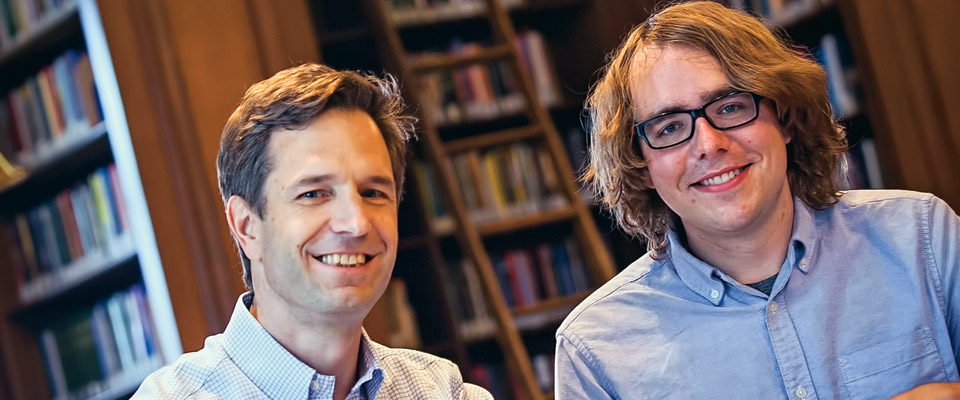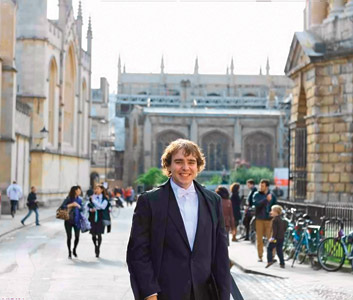Call of the Oxford Oracle

T.J. Bolt ’12 (right) and Prof. Markus Dubischar
by Stevie O. Daniels
Betrayal, abuse of power, lost love. Scenes from a current movie? Yes, and themes brought to life in the works of Greek tragedians more than 2,000 years ago.
“These plays continue to be read and studied,” says T.J. Bolt ’12, “because they shed wisdom on what it means to be human.”
Now in his second year of a master’s program in Greek and Latin language and literature at University College, Oxford, Bolt came to Lafayette with interests in literature and history. He was inspired to pursue a self-designed major in classics along with an English major, with the initial motivation coming in a course on classical mythology taught by Markus Dubischar.
“I seized the opportunity to continue to study Latin, building on two years of previous study,” he says. He started studying ancient Greek as a sophomore.
“These plays continue to be read and studied because they shed wisdom on what it means to be human.”
—T.J. BOLT ’12
Bolt spent his junior year at Oxford, “studying Greek by reading Homer and Latin by reading Virgil.” He felt better prepared and more advanced than other students, he says, thanks to Dubischar’s dedicated mentoring. “He even enhanced and deepened my knowledge of Greek through lessons by telephone before I departed.”
As an EXCEL Scholar, Bolt had assisted Dubischar, an associate professor of classics and chair of the classical civilizations minor, with his research. They studied Antigone and compared messenger speeches in Sophocles and Euripides, examining compositional and structural techniques. The work became part of an article by Dubischar on formal composition and plot structure in Euripides that will be published in Wiley-Blackwell Companion to Euripides.

In Radcliffe Square, Oxford University
“The messenger speeches are an anticipated part of the tragedy,” Dubischar says. “The audience is captivated by these gripping, memorable reports—usually about a battle, the story of betrayal, or the tale of the impact of the gods acting in a human’s life.”
“Studying these tragedies is also a way of learning to think critically,” Bolt adds. “For instance, we can examine the techniques that make the speeches so persuasive and recognize those same techniques used in speeches today.”
After his year in Oxford, Bolt says, “I knew I wanted to go back.” The Buffalo, N.Y., native feels at home there. “Univ” as his college is known, “has about 200 graduate students from all different academic majors and from countries around the world. It’s where we live and eat and sometimes attend class.”
He’s president of Weir Common Room, which “is both the body of graduate students at University College and the place where graduate students can relax and socialize,” as its website explains. Bolt calls it Oxford’s most active and social graduate community. No surprise. He previously served as entertainment officer, running WCR’s social calendar. Last summer he was in charge of activities—“Minister of Fun”—for Oxford Prep, a program for new students.
Bolt taught Latin to first-year Oxford students last year and is now teaching it to children through an outreach program in which graduate students introduce the classics in elementary schools.
Oxford tradition? He loves it. Robes are worn for college ceremonies, exams, and, three days a week, for dinner. “And when we take exams,” he says, “we wear a white carnation the first day, pink carnation the second day, and red carnation the third day.”